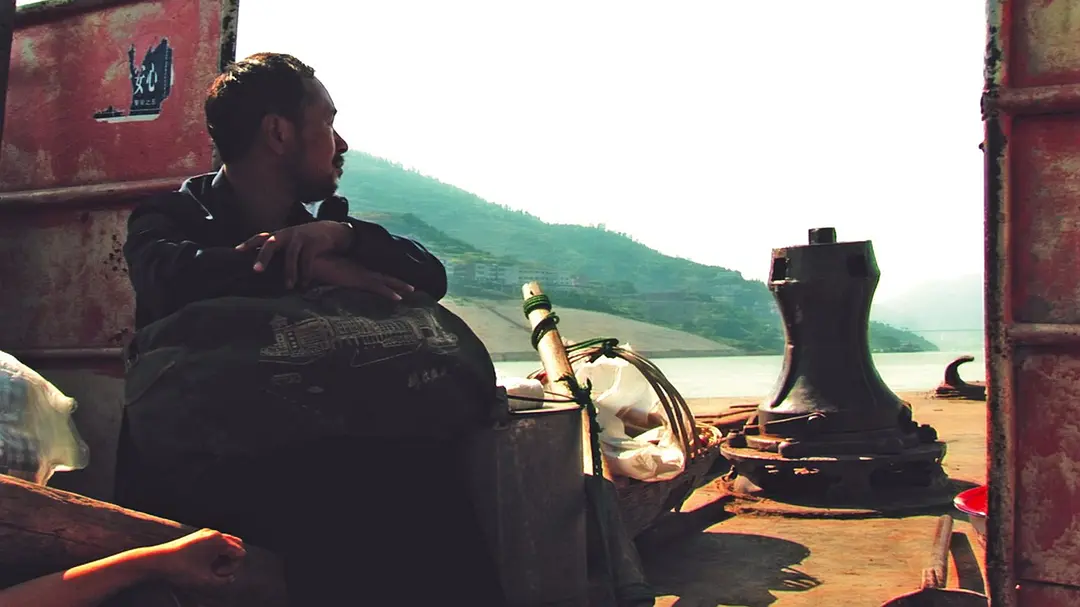Homeland sinks beneath the water, and people search like duckweed.
One seeks his wife, the other her husband, trudging through the ruins of Fengjie, where the roar of demolition and the rising river waters fill.
Cigarettes, alcohol, tea, and candy are tokens of love and comfort.
Amidst the shattered walls and the turbidity of the world, old feelings have been washed away by the currents of time, becoming blurred.
They walk in silence, watch in silence, and bid farewell in silence.
The end of their search may not be reunion, but rather a reassurance, amidst the clamor, that they can still stand firm on the ferry.
Characters profile
Han Sanming: Obsession in the dust, rock in the river

He emerged from the coal dust and darkness of Shanxi, the years of mining carved into his palms, bent his back, leaving only a cloudy and stubborn gaze. Like a worn piece of pottery, he was rough and hard. Sixteen years had been enough to sink a city, and his obsession with finding his wife had fermented into a stubborn stone in the dark.
He suddenly pierced Fengjie, a city torn apart by the river and demolition. His hazy jacket and slow steps measured the ravines of life. The silence was filled with sighs from the mines, unpaid bills, vague thoughts of his daughter, and a long-vanished "home." His bag was simple: a few old clothes, some dry food, and a bottle of aged vinegar—solidified homesickness. Unaware of the hustle and bustle of the river city and its sorrow, he stubbornly inquired in the muddy wind, his thick hometown accent. His search, clumsy and slow, was like a rock anchoring a small wish in the turbulent times: to find her.
He is a humble, hard speck of dust on the flood line, a name that could be erased, yet a living witness to the drastic transformation of the land. His hunched back stands by the ruined riverbank, a moving monument to the struggle and resilience of an individual beneath the mighty ship. His search is a salvage of the lost, a faint affirmation of existence, and a silent elegy for the millions of "Han Sanmings." His presence embodies the silent dignity that remains unwashed in the depths of the dust.
Shen Hong: A buoy in the fog, an undercurrent of self-discovery

A sense of alienation, drenched in disinfectant. Shen Hong, a question mark drifting from a hospital ward in Taiyuan. Beneath her calm eyes lies the mist of the Three Gorges. Her journey across thousands of miles to find her husband feels more like measuring the desolate shores left by the ebbing tide of emotion.
She appeared amid the bustle and ruins of Fengjie, clad in washed-out blue work clothes, her figure as thin as a boat in the mist. Her steps hesitated, her silence a detached clarity. Her bag contained documents (the coldness of the contract), old photos (the lingering warmth of memory), and silent doubts. Her questions, soft as a scalpel, precisely dissected lies.
She was a lone buoy in the mist of the Three Gorges. A drop of water in the urban torrent, a dark mark in the ledger of emotions. Her cold figure stood at the ruins of the dock, a self-conscious, silent marker of a woman caught in the cracks of time.
During those years, the Three Gorges Reservoir was featured extensively on television news. Even from afar, seeing all the glorious news, it was easy to believe it, to assume it was the truth. From the demarcation of the reservoir area, villages and residents within it were forced to relocate from their ancestral homes. Later, my father told me that my county-level city was one of the relocation sites.
The county embarked on a massive construction project, building a brand new residential complex complete with a greenhouse, a field, and a primary school. "It's boosting our city's economy and securing new funding," said my father, who worked in the government and had overseen several projects. Sometimes, when our family was out driving, he'd point and say, "That's it! Look, all those buildings." At that time, the county was full of self-built houses, some five or six stories high.
We passed by the residential complex, which was being used as a scenic spot, and soon after, we heard that the people relocating from the Three Gorges were already on their way. Led by military vehicles, a large procession of relocated residents arrived, and county residents lined the streets to welcome them. A single row of military-green vehicles filled the road, leaving no other vehicles.
I didn't know what kind of vehicle it was, but it looked like a large truck with a trailer attached to the front. The trailer was covered in cloth, with a small doorway at the rear. It was pitch black, and I couldn't see much inside. As it drove by, a strong stench filled the air. It wasn't even summer yet, but the smell of a garbage dump under the scorching sun was palpable.
Even from a distance, standing on the sidewalk, I could smell it even with my hands covered. The residents nearby said it didn't look like people, but rather goods and livestock. As we stood there, waiting for the vehicles to arrive, we watched as all the cars passed by, one by one, until we could no longer see them, not even a bus. A foul odor lingered. Perhaps the distance and the swaying of the vehicles had caused an animal to die inside, creating such a foul odor.
When I got home, my father informed me that the residents had moved in. I was puzzled; I didn't see a single person. They lived outside the city, closer to the countryside. I never saw anyone whose face showed they were from the Three Gorges. I remember that after we moved here, it rained a few times, perfect for planting.
One evening, my father came home from get off work with a large, white, foam-filled insulated box. He said it was filled with strawberries grown in a greenhouse by the relocated residents and sold at the market.
They were small, but exuded the distinctive strawberry fragrance, not at all smelly. Juicy, light red, and very sweet, I devoured them like I'd never eaten strawberries before.
